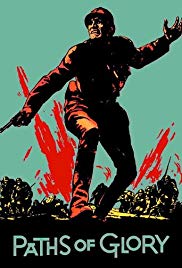PATHS OF GLORY
SUBJECTS — World/WWI & France;
SOCIAL-EMOTIONAL LEARNING — None;
MORAL-ETHICAL EMPHASIS — Trustworthiness.
AGE: 10+; No MPAA Rating;
Drama; 1957; 86 minutes; Black & White. Available from Amazon.com.
There is NO AI content on this website. All content on TeachWithMovies.org has been written by human beings.

SUBJECTS — World/WWI & France;
SOCIAL-EMOTIONAL LEARNING — None;
MORAL-ETHICAL EMPHASIS — Trustworthiness.
AGE: 10+; No MPAA Rating;
Drama; 1957; 86 minutes; Black & White. Available from Amazon.com.
TWM offers the following worksheets to keep students’ minds on the movie and direct them to the lessons that can be learned from the film.
Film Study Worksheet for a Work of Historical Fiction and
Worksheet for Cinematic and Theatrical Elements and Their Effects.
Teachers can modify the movie worksheets to fit the needs of each class. See also TWM’s Historical Fiction in Film Cross-Curricular Homework Project.
This is a fictional tale of a failed assault by French troops during WWI on an impregnable German position called “The Ant Hill.” To deflect blame from the general who ordered the assault, several French soldiers were picked at random, branded cowards, and court-martialed. This film is based on the novel by Humphrey Cobb.
Selected Awards:
“Paths of Glory” is listed in the National Film Registry of the U.S. Library of Congress as a “culturally, historically or aesthetically significant” film.
Featured Actors:
Kirk Douglas, Adolphe Menjou, George Macready, Ralph Meeker, Richard Anderson, Wayne Morris, Timothy Carey, Susanne Christian.
Director:
Stanley Kubrick.
“Paths of Glory” is an introduction to World War I and to the political intrigues which often diminish the fighting ability of armies.
None.
Before watching the film, briefly describe the history of the First World War. See Helpful Background. Immediately after the movie, or at odd times over the next week (for example at the dinner table or in the car on the way to school) bring up some of the Discussion Questions, starting with the Quick Discussion Question below. Don’t worry if you can only get through a few questions. Just taking the film seriously and discussing it is the key. Allow your child to watch the movie several times and continue to bring up discussion questions relating to the film.
See Learning Guide to All Quiet on the Western Front for a description of trench warfare.
World War I was caused by strong feelings of nationalism, an economic rivalry between nations, the existence of large armies on all sides, and a history of hostilities in previous centuries that left countries and peoples with a feeling that they needed to get even with each other. The rulers of the German nation, united only since 1871, wanted to become a sea power and acquire a colonial empire. To fulfill these ambitions, Germany built up its navy, triggering a naval armaments race between England and Germany.
In 1870, the French army had been crushed by the German army. Paris had been besieged and starved into submission. France was forced to pay vast sums to Germany in “reparations” and to give up Alsace-Lorraine, a large, economically important region on the border between the two countries.
Europe was divided into two military alliances: the Triple Entente of Great Britain, France, and Russia and the Triple Alliance of Germany, Austria-Hungary, and Italy. In 1908, Austria-Hungary annexed Bosnia and Herzegovina. The nationalist movement in Serbia wanted to acquire the southern part of Bosnia and was hostile to the annexation. Serbia, however, was too weak to fight Austria-Hungary without the support of Russia. When Archduke Ferdinand of Austria was assassinated by Serb terrorists in Sarajevo, Austria-Hungary used the event as an excuse to invade Serbia. Russia mobilized to defend Serbia. Germany and Austria-Hungary declared war on Russia and France. Great Britain then declared war on Germany and Austria-Hungary. The Great War was on.
1. See Discussion Questions for Use With any Film that is a Work of Fiction.
2. Was Colonel Dax naive to think that justice could be found in war?
Discussion Questions Relating to Ethical Issues will facilitate the use of this film to teach ethical principles and critical viewing. Additional questions are set out below.
(Be honest; Don’t deceive, cheat or steal; Be reliable — do what you say you’ll do; Have the courage to do the right thing; Build a good reputation; Be loyal — stand by your family, friends and country)
For information about many aspects of World War I see World War I: Trenches on the Web.
In addition to websites which may be linked in the Guide and selected film reviews listed on the Movie Review Query Engine, the following resources were consulted in the preparation of this Learning Guide:
This Learning Guide was last updated on December 17, 2009.